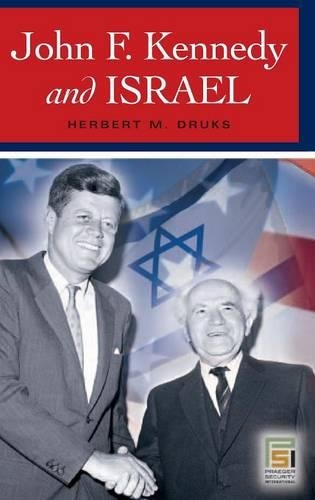
John F. Kennedy and Israel
(Hardback)
Publishing Details
John F. Kennedy and Israel
By (Author) Herbert Druks
Bloomsbury Publishing PLC
Praeger Publishers Inc
30th October 2005
United States
Classifications
General
Non Fiction
History of the Americas
327.7305694
Physical Properties
Hardback
208
Description
John F. Kennedy entered the White House hoping to make America and the world a better and safer place in which to live. Through diplomacy, he wanted to achieve a settlement of the East-West tensions and to bring about a peaceful resolution to such issues as the Israeli-Arab conflict. Although his provision of defensive HAWK anti-aircraft missiles, in response to Russian, French, and British arms sales to the Arabs, made him the first President to supply arms to Israel, Kennedy feared both exacerbation of the arms race and the proliferation of nuclear weapons. While he remained an honest and loyal friend to Israel, he also attempted to further America's relationship with the Arab states and to encourage a settlement of the Arab refugee issue. Kennedy was an independent thinker who learned how to rely upon his own best judgment and intelligence rather than upon his father or officials like Dean Rusk or Allen Dulles. Kennedy ultimately agreed to regular consultations between Israeli and American military personnel, but he would not agree to a dual alliance nor would he allow America to become Israel's main source of military equipment. The author contends that it was this precarious and uncertain diplomatic and military situation that encouraged Israel to develop its own defense industries and to investigate the possibilities of producing its own nuclear weapons systems.
Reviews
John F. Kennedy and Israel has much to say on how history ought to judge Kennedy. Druks' narrative shows Kennedy able to focus in perspective and insightful ways on the Middle East even as the Cuban missile crisis and the civil rights movement necessarily took much of his time. The lasting impact on the Middle East of what brief time JFK had is inescapable to anyone reading Herbert M. Druks's fascinating book. * Hadassah Magazine *
[D]ruks' book is well written, and the reader easily beomes revited with the dramatic relationships of the Kennedy family world politics. It is hard to put the book down. For a study of international affairs, this is not an easy task, and the author is to be commended for presenting an important book in a very readable and fascinating style. * www.jewishgrowth.org *
One might credit Druks for writing with his politics clearly displayed. It is starkly clear that the author strongly likes Israel, strongly dislikes the Arab states, and has serious grievances with the State Department and the Dwight D. Eisenhower administration (on the grounds that they were harsh on Israel). While some readers might find the author's passion a bit grating, others will appreciate his commitment to say what he thinks. * The Journal of American History *
Author Bio
Herbert M. Druks is Professor of History and Politics in the Department of Judaic Studies at Brooklyn College. He has taught at Haifa University, The School of Visual Arts, and Yale University. His previous books include The Uncertain Friendship: The U.S. and Israel, from F.D.R. to Kennedy (Greenwood, 2001) and The Uncertain Alliance: The U.S. and Israel from Kennedy to the Peace Process (Greenwood, 2001).
